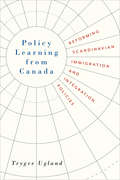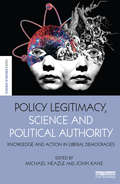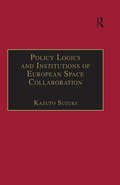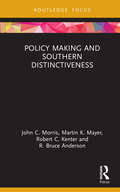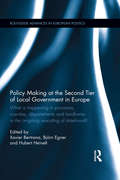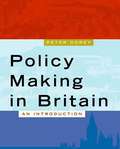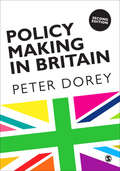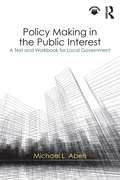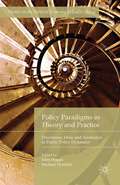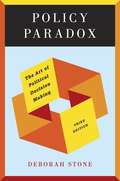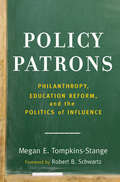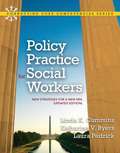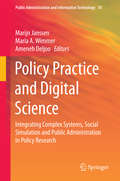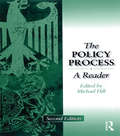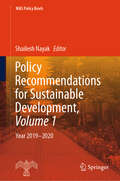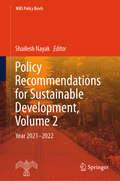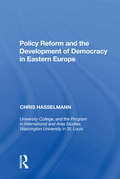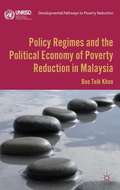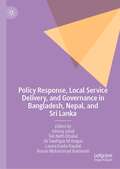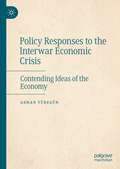- Table View
- List View
Policy Learning from Canada: Reforming Scandinavian Immigration and Integration Policies
by Trygve UglandFocusing on the three Scandinavian countries, Denmark, Norway, and Sweden, Policy Learning from Canada is a systematic study of the international relevance of the Canadian immigration and integration policy model. To reveal how the Canadian immigration model has shaped the reform process in Scandinavia, Trygve Ugland critically examines public documents, including government proposals, documents from parliamentary debates, and reports by ad-hoc expert commissions, as well as letters from consulted agencies. Ugland’s intensive studies on Canada’s immigration and integration policies depict Canada not only as a model and inspiration to Scandinavian policy makers, but, in particular, as an intellectual stimulus for the rediscovery of labour immigration in Scandinavia during the 2000s. The study demonstrates that the Canadian model, often perceived as a product of unique circumstances, can be relevant in other countries.
Policy Legitimacy, Science and Political Authority: Knowledge and action in liberal democracies (The Earthscan Science in Society Series)
by Michael Heazle John KaneVoters expect their elected representatives to pursue good policy and presume this will be securely founded on the best available knowledge. Yet when representatives emphasize their reliance on expert knowledge, they seem to defer to people whose authority derives, not politically from the sovereign people, but from the presumed objective status of their disciplinary bases. This book examines the tensions between political authority and expert authority in the formation of public policy in liberal democracies. It aims to illustrate and better understand the nature of these tensions rather than to argue specific ways of resolving them. The various chapters explore the complexity of interaction between the two forms of authority in different policy domains in order to identify both common elements and differences. The policy domains covered include: climate geoengineering discourses; environmental health; biotechnology; nuclear power; whaling; economic management; and the use of force. This volume will appeal to researchers and to convenors of post-graduate courses in the fields of policy studies, foreign policy decision-making, political science, environmental studies, democratic system studies, and science policy studies.
Policy Logics and Institutions of European Space Collaboration
by Kazuto SuzukiFocusing on European collaboration outside of the European Union (EU), this volume deepens the analysis of the current status of space policy in Europe, looking at the roles and functions of the institutions of European space collaboration, and what influences the interests and strategies of experts and policy-makers. Providing a new conceptual framework, the book also develops an innovative perspective for understanding the interactions between international and domestic policy-making, as well as a comprehensive analysis of how European states collaborate in a security-sensitive area such as space. This invaluable work is suitable for courses on and specialists in European studies, international relations and international political economy.
Policy Making and Southern Distinctiveness (Routledge Research in Public Administration and Public Policy)
by John C. Morris Martin K. Mayer Robert C. Kenter R. Bruce AndersonPolicy Making and Southern Distinctiveness examines the uniqueness of southern politics and their policy choices. While decades of scholarship on the politics of the American South have focused on partisanship and electoral outcomes as the primary elements of interest in southern politics, few works have focused on the more practical outcomes of these political processes, specifically, comparing state policy choices of southern states to non-southern states. This book examines six different policy arenas: voting access, gun control, health care, reproductive rights, water, and COVID-19 pandemic response, comparing policy choices in states in the South with states in the non-South. The authors find that the South is distinct in several, but not all, of the policy arenas examined. They conclude that the South as a region is unique because of the exceptional degree of one-party control evident in the South, coupled with a long-standing preoccupation with partisanship and race-based politics. Policy Making and Southern Distinctiveness provides valuable insights into how and why states behave in the manner they do and where southern states may diverge from the rest of the country. It will be of interest to scholars of southern politics, state comparative policy, public policy, American politics, and federalism/intergovernmental relations.
Policy Making and Southern Distinctiveness (Routledge Research in Public Administration and Public Policy)
by John C. Morris Martin K. Mayer Robert C. Kenter R. Bruce AndersonPolicy Making and Southern Distinctiveness examines the uniqueness of southern politics and their policy choices.While decades of scholarship on the politics of the American South have focused on partisanship and electoral outcomes as the primary elements of interest in southern politics, few works have focused on the more practical outcomes of these political processes, specifically, comparing state policy choices of southern states to non-southern states. This book examines six different policy arenas: voting access, gun control, health care, reproductive rights, water, and COVID-19 pandemic response, comparing policy choices in states in the South with states in the non-South. The authors find that the South is distinct in several, but not all, of the policy arenas examined. They conclude that the South as a region is unique because of the exceptional degree of one-party control evident in the South, coupled with a long-standing preoccupation with partisanship and race-based politics.Policy Making and Southern Distinctiveness provides valuable insights into how and why states behave in the manner they do and where southern states may diverge from the rest of the country. It will be of interest to scholars of southern politics, state comparative policy, public policy, American politics, and federalism/intergovernmental relations.
Policy Making at the Second Tier of Local Government in Europe: What is happening in Provinces, Counties, Départements and Landkreise in the on-going re-scaling of statehood? (Routledge Advances in European Politics)
by Hubert Heinelt Xavier Bertrana BjDebates about multi-level governance have led to a profound restructuring of regional and local government. The second level of local government is under review in most European countries, with the aim to strengthen the institutional capacity of municipalities or to develop appropriate institutional structures for governing fragmented urban areas. This book provides a thematic and cross-national analysis of the key actors in local government that form the crucial components of effective and democratic policy making. Focussing on the second tier of local government, it examines new empirical data on councillors from this level of government in 15 European countries and integrates important variables such as party politics, notions of democracy, finance, multi-level settings. Divided into five parts, it addresses: Attitudes of county/provincial councillors towards administrative and territorial reforms; Their role perceptions and role behaviour; Their political orientation; Actor constellations and governance arrangements; Political socialization and recruitment, professionalization and career patterns of county/provincial councillors. This book will be of interest to students and scholars of local government, urban studies, regional studies, political science, sociology and geography.
Policy Making in Britain: An Introduction
by Peter Dorey'By applying the range of tools of policy analysis to the detail of the policy making machinery of British government, Peter Dorey's text has met a need for teachers and students of these subjects which has not been fulfilled for a decade or more. I have adopted it straight away as a 'must buy' for my own students' - Justin Greenwood, Robert Gordon University 'A very welcome addition to the literature on public policy-making in contemporary Britain and ideal for teaching purposes. Peter Dorey's new book is clearly written, theoretically informed, but also rich in illustration. A key resource for all students of British public policy' - Dr Andrew Denham, Reader in Government, University of Nottingham This accessible textbook introduces students to the public policy-making process in Britain today. Assuming no prior knowledge, it provides a full review of the key actors, institutions and processes by addressing the following questions: who sets the public policy agenda? who influences the detail of public policy? what makes for successful implementation of public policy? is there such a thing as 'British' public policy? Peter Dorey is careful to ground theory in the reality of contemporary British politics and the text fully assesses the impact of devolution and European integration and the evolution from government to governance. The result is a lively and accessible new text that will be required reading for all students of contemporary British politics, public policy and governance.
Policy Making in Britain: An Introduction
by Peter DoreyIntroducing you to the public policy making process in Britain today, this book adopts an empirical approach to the study of policy making by relating theory to actual developments in Britain since the 1980s. It covers: Ideas, Problem Definition, Issues and Agenda-Setting Key Individuals Key Institutions Parliament and Public Policy Implementation The shift from Government to Governance (including marketization, and devolution) The increasing role of the private and voluntary sectors in policy delivery Internationalisation and Europeanization of policies and policy making Evaluation, audits and the New Public Management Each chapter is enriched by recent real-life case studies and boxes illustrating key arguments, concepts and empirical developments. Taking into account the 2010 election and beyond, the book addresses current issues, developments and debates. The result is a contemporary and engaging text that will be required reading for all students of British politics, public policy and public administration.
Policy Making in the Public Interest: A Text and Workbook for Local Government
by Michael L. AbelsPolicy Making in the Public Interest is the first text and workbook to provide a short and firmly focused introduction to local government policy making techniques. Each chapter introduces core policy concepts and competencies and concludes with exercises that encourage the reader to apply the theme of the chapter to a practical policy issue in local government, such as city-planning, community-economic development, public safety programming, utility planning, developing regional partnerships, and sustainable growth and development. The exercises explore issues students are likely to analyze as interns or observe in a service learning assignment with local government. For practitioners and elected officials, the exercises focus on issues commonly confronted on the job. This unique approach is designed specifically to lead the reader to a complete and multi-dimensional understanding of ‘the public interest’ and to provide tools for identifying and adopting local government policies that will support it. An accompanying eResource page contains grading forms to evaluate verbal presentations and analytical work, PowerPoint slides, downloadable forms for students and practitioners, as well as links and resources. Policy Making in the Public Interest is an essential text and workbook for classes in public policy or local government operations, a vital self-guided handbook for managers and elected officials, and a useful resource and instructional guide for workshops.
Policy Network Ties in the Dynamic Process of Environmental Conflict Resolution: Uncovering the Evolution of Environmental Governance (Environment & Policy #60)
by Seunghoo LimExtensive previous research has investigated environmental conflict management issues in networked settings and the design of policy networks, but the emergence and evolution of self-organizing policy networks are still not fully understood. Especially misunderstood is the problem of how the multiple motivations or incentives of competing policy actors in conflictual situations affect their structures of interaction, as this issue has not been studied systematically. This book aims to address the following research questions: how do policy stakeholders cope strategically with collective action or environmental conflict resolution? How do they utilize or maintain formal and informal policy networks to resolve problems effectively? What motivates them to engage or be involved in collaborative or conflictual networks? What influences their networking or their decisions on partner selection for conflict resolution? This book consists of four studies. The goal of the first study is to examine the form of a policy network by focusing on how policy networks emerge and evolve at the micro-level to solve collective action dilemmas endemic to decentralized and democratized policy decision-making processes, particularly in the environmental conflict resolution arena. The goal of the second study is to examine the main policy actors and structural characteristics of network governance evolution in the dynamic process of environmental conflict resolution. The goal of the third study is to highlight the role of policy tie formality in the evolution of multiplex ties in the environmental conflict resolution process. The goal of the fourth study is to demonstrate the relationships between patterns of interactions among policy actors and their modified and adjusted strategic behaviours within policy networks and across advocacy coalitions.
Policy Paradigms in Theory and Practice: Discourses, Ideas and Anomalies in Public Policy Dynamics (Studies In The Political Economy Of Public Policy)
by Michael Howlett John HoganThe contributors investigate policy paradigms and their ability to explain the policy process actors, ideas, discourses and strategies employed to provide readers with a better understanding of public policy and its dynamics.
Policy Paradigms in Theory and Practice: Discourses, Ideas and Anomalies in Public Policy Dynamics (Studies in the Political Economy of Public Policy)
by Michael Howlett John HoganThe contributors investigate policy paradigms and their ability to explain the policy process actors, ideas, discourses and strategies employed to provide readers with a better understanding of public policy and its dynamics.
Policy Paradigms, Transnationalism, and Domestic Politics
by Grace SkogstadPolicy Paradigms, Transnationalism, and Domestic Politics offers a variety of perspectives on the development of policy paradigms -- the ideas that structure thinking about what can and should be done in a policy domain. In this collection, international experts examine how both transnational actors and domestic politics affect the structuring of these paradigms.As well as theoretical chapters, this volume includes six case studies showing ideas at work in a diverse range of policy domains from the recognition of same-sex unions to risk regulation of genetically modified organisms. These qualitative analyses show how transnational activities shape policy paradigms by building consensus on ideas about feasible and desirable public policies across authoritative decision-makers. Expertly researched and assembled, Policy Paradigms, Transnationalism, and Domestic Politics provides insight into the conditions under which different transnational actors can bring about changes in the core ideas that affect public policy development.
Policy Paradox: The Art of Political Decision Making (Third Edition)
by Deborah StoneThe most accessible policy text available. Policy making is a political struggle over values and ideas. By exposing the paradoxes that underlie even seemingly straightforward policy decisions, Policy Paradox shows students that politics cannot be cleansed from the process in favor of "rationality. " Author Deborah Stone has fully revised and updated this popular text, which now includes many paradoxes that have arisen since September 11. Examples throughout the book have been updated, and the prose has been streamlined to make a great read even better.
Policy Patrons: Philanthropy, Education Reform, and the Politics of Influence (Educational Innovations Series)
by Megan E. Tompkins-StangePolicy Patrons offers a rare behind-the-scenes view of decision making inside four influential education philanthropies: the Ford Foundation, the W. K. Kellogg Foundation, the Bill & Melinda Gates Foundation, and the Eli and Edythe Broad Foundation. The outcome is an intriguing, thought-provoking look at the impact of current philanthropic efforts on education. Over a period of several years, Megan E. Tompkins-Stange gained the trust of key players and outside observers of these four organizations. Through a series of confidential interviews, she began to explore the values, ideas, and beliefs that inform these foundations&’ strategies and practices. The picture that emerges reveals important differences in the strategies and values of the more established foundations vis-à-vis the newer, more activist foundations—differences that have a significant impact on education policy and practice, and have important implications for democratic decision making. In recent years, the philanthropic sector has played an increasing role in championing and financing education reform. Policy Patrons makes an original and invaluable contribution to contemporary discussions about the appropriate role of foundations in public policy and the future direction of education reform.
Policy Practice For Social Workers: New Strategies For A New Era (Connecting Core Competencies Series)
by Laura Pedrick Linda Cummins Katharine ByersIntroduction to Policy Practice shows future social work practitioners how to actively influence policy-making through lobbying, coalition building and running campaigns. It helps them to master social problem analysis and policy analysis and uses theoretical and empirical knowledge for the application of policy practice techniques. Each chapter reflects and integrates the core competencies in the 2008 Educational Policy and Accreditation Standards (EPAS) set by the Council on Social Work Education (CSWE). End-of-chapter assessment reinforces this integration, and MySocialWorkLab.com activities support the mastery of CSWE's core competencies.
Policy Practice and Digital Science
by Maria A. Wimmer Marijn Janssen Ameneh DeljooThe explosive growth in data, computational power, and social media creates new opportunities for innovating the processes and solutions of Information and communications technology (ICT) based policy-making and research. To take advantage of these developments in the digital world, new approaches, concepts, instruments and methods are needed to navigate the societal and computational complexity. This requires extensive interdisciplinary knowledge of public administration, policy analyses, information systems, complex systems and computer science. This book provides the foundation for this new interdisciplinary field, in which various traditional disciplines are blending. Both policy makers, executors and those in charge of policy implementations acknowledge that ICT is becoming more important and is changing the policy-making process, resulting in a next generation policy-making based on ICT support. Web 2. 0 and even Web 3. 0 point to the specific applications of social networks, semantically enriched and linked data, whereas policy-making has also to do with the use of the vast amount of data, predictions and forecasts, and improving the outcomes of policy-making, which is confronted with an increasing complexity and uncertainty of the outcomes. The field of policy-making is changing and driven by developments like open data, computational methods for processing data, opining mining, simulation and visualization of rich data sets, all combined with public engagement, social media and participatory tools.
Policy Process: A Reader
by Michael HillIn this new edition of his classic reader, Michael Hill seeks to make the selected extracts reflect a more European outlook on the processess of policy-making and implementation. With reference to the third edition of his popular textbook, The Policy Process in the Modern State, Hill has maintained the thematic approach of the first edition, looking in turn at approaches to policy making in Europe, power, bureaucracy and the State, the rationality/incrememtalism debate, the role of organisational theory in policy implementation, street-level bureaucracy and discretion. Already praised as one of the best readers available in thisfield, Michael Hill's new edition will be even more valued as a reference and teaching resource by students and lecturers alike.
Policy Recommendations for Sustainable Development, Volume 1: Year 2019_2020 (NIAS Policy Briefs)
by Shailesh NayakThe book contains policy-related publications based on research conducted by the National Institute of Advanced Studies. These publications address and support sustainable development goals, such as energy and the environment, education, inequality, human development, and peace research, among others. This volume fosters comprehensive research focused on these global targets and endeavors to address some of society's greatest grand challenges. The book will be extremely beneficial for researchers, academicians, practitioners, and policymakers working in the areas of the 17 Sustainable Development Goals (SDGs).
Policy Recommendations for Sustainable Development, Volume 2: Year 2021-2022 (NIAS Policy Briefs)
by Shailesh NayakThe book contains policy-related publications based on research conducted by the National Institute of Advanced Studies. These publications address and support sustainable development goals, such as energy and the environment, education, inequality, human development, and peace research, among others. This volume fosters comprehensive research focused on these global targets and endeavors to address some of society's greatest grand challenges. The book will be extremely beneficial for researchers, academicians, practitioners, and policymakers working in the areas of the 17 Sustainable Development Goals (SDGs).
Policy Reform and the Development of Democracy in Eastern Europe
by Chris HasselmannIntegrating the international pressures emanating from the Washington Consensus with an analysis of domestic interest representation, this book explores the political consequences of privatization and the progress of democracy in Eastern Europe. Chris Hasselmann investigates whether the issue of pension reform offers a natural controlled experiment with which to explore both issues throughout the region and the former Soviet Union. The volume will prove of value to those with an interest in public policy and governance issues, the politics of Eastern Europe and political theory more generally.
Policy Regimes and the Political Economy of Poverty Reduction in Malaysia
by Khoo Boo TeikMalaysia's 40-year strategy of 'poverty eradication' has met with a great deal of success, yet has caused controversy for its links to ethnically-oriented social restructuring. This book is a critical evaluation of changing policy regimes affecting Malaysia's development, record of industrialization, and efficacy in adapting social policies.
Policy Response, Local Service Delivery, and Governance in Bangladesh, Nepal, and Sri Lanka
by Ishtiaq Jamil Tek Nath Dhakal Sk Tawfique M Haque Laxmi Kanta Paudel Hasan Muhammad BaniaminThis book analyzes contemporary issues in governance, policy management, and policy performance both at the central and local levels in Bangladesh, Nepal, and Sri Lanka. The focus is on some central social issues such as empowerment, the inclusion of minorities, institutional trust, policy implementation, and local service delivery. Although these three countries have recently opted for democratic governance, the journey to establish and consolidate democracy as well as enhance governance capacity have been painful and filled with challenges. The chapters in this volume are country specific studies based on empirical data both quantitative and qualitative collected for several years and presented in readable prose. This does not, however, rule out the general applicability of the findings to other contexts within and beyond the borders of these countries. Despite huge differences in South Asia, the policy and governance issues and challenges that are explored, highlighted, and analyzed also have commonalities with other South Asian countries.
Policy Responses to the COVID-19 Pandemic: An International Comparative Approach (Public Administration and Public Policy)
by M. Jae Moon Dong-Young KimThis book examines why and how different countries developed different policy positions and responses to the COVID‑19 pandemic, particularly in the early phase, by surveying a sample of countries that are geographically, politically, and culturally diverse, particularly those representing the East and the West.Exploring nine countries, namely four Western countries (Finland, Germany, United States, and Sweden) and five Asia‑Pacific countries (Japan, New Zealand, South Korea, Thailand, and Vietnam), contributors to this comprehensive new book compare and contrast similarities and differences in political systems, (de)centralization, policy responses, citizen engagement, and other factors. Written by experts on public policy within each of the counties explored, the chapters investigate how policy responses may be linked to the spread of the virus and fatalities in each location, drawing lessons from those experiences. Coercive tools (border control, school closure, movement constraints), incentive tools (emergency assistance, economic boosting assistance), and informative and facilitative tools (public information campaigns for social distancing, mask wearing) are all explored. In addition to policy responses, other contributing factors are carefully weighed, including national health care systems, applications of digital technology, institutional arrangements and governance systems, and political and civic culture.This book is required reading for undergraduate and graduate students interested in comparative public policy and public governance, as well as policy‑makers, government officials, and nonprofit workers in both developed and developing countries.
Policy Responses to the Interwar Economic Crisis: Contending Ideas of the Economy
by Adnan TüregünThis book is about national economic policy responses to the Great Depression of the interwar period. Taking off from a generally liberal starting point in the 1920s, states diverged greatly in their responses. Some were daring while others remained conservative. The two groups further differed among themselves in both degree and kind. The book gives a certain shape to this messy reality by identifying broad policy patterns (paradigms), and offers an explanation of it which emphasizes the ideational disposition of policy actors while recognizing the context that limits what they can do. More specifically, it argues that the ideas held by rulers and the strategies they consequently developed regarding three major groups of interest – business, labour, and, most critically, agrarians – largely determined economic policy variation across nations.
